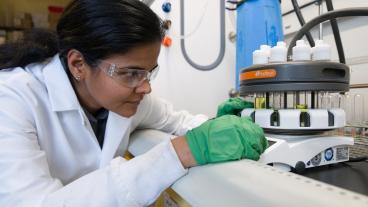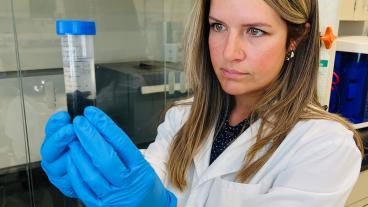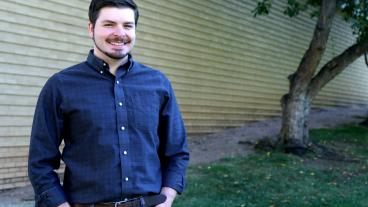Bringing academic research into the real world: Mines student research on underground construction becoming part of industry work
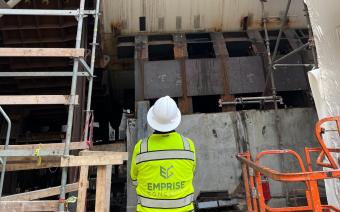
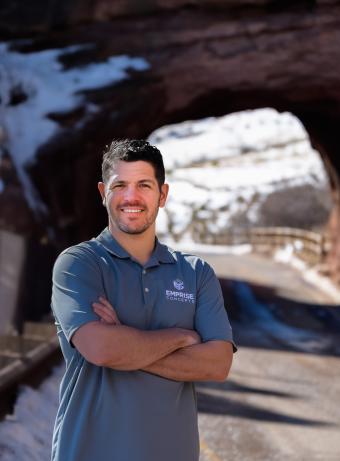
When Jacob Grasmick MS ’13, PhD ‘19 was in graduate school at Colorado School of Mines, he hoped that the research he was doing would eventually advance industry practices. Now an alum of the Civil Engineering program and Center for Underground, Grasmick co-owns an engineering firm, Emprise Concepts, and is bringing what he learned at Mines into real life application.
“I am driven by the prospect of implementing research into practice and helping to bridge that gap that we often see between academia and the industry,” Grasmick said.
Grasmick’s dissertation research at Mines focused on better understanding ground conditions for tunneling and other construction projects that depend on accurate data about subsurface conditions, especially in urban environments. Commonly, current practice relies on a subjective interpretation of the variables involved in underground construction, Grasmick said. He worked on developing more reliable, data-driven risk quantifications of ground conditions, analyzing data sets from around the world in North America, the United Kingdom, Singapore, Hong Kong and New Zealand.
With the goal of getting his data-driven risk quantifications into industry, Grasmick applied for a National Science Foundation (NSF) America’s Seed Fund grant, which provides financial support for scientific and engineering discoveries with the potential to transform into products and services with commercial and societal impact. Emprise Concepts was awarded this grant in May, with Mines as a sub awardee, receiving $275,000 split between his business and Mines. He’s working on a six-to-12-month feasibility study, and then will submit for Phase Two of the grant, which awards up to $1 million for one to two years.
“The NSF looks for projects that will have a broader impact on the health and well-being of society,” Grasmick said. “Our work fits nicely in line with the challenge we have as a nation with needing to upgrade and build new infrastructure, with the aim to help reduce the cost of civil infrastructure construction and helping make new infrastructure more sustainable.”
With the help of the grant, the team is developing a computational tool to create and update subsurface models in real time using data-driven advanced analytics. The project strives to improve the understanding of ground conditions by providing a solution to update the models during underground construction in a routine and autonomous manner, making full use of the wealth of data collected during construction.
Michael Mooney, Grewcock Chair Professor of Underground Construction and Tunneling, served as Grasmick’s PhD adviser. He said the techniques Grasmick worked on within the Center for Underground at Mines help better quantify the risks involved during tunnel construction.
“Seeing these techniques that Jacob spearheaded be implemented in tunnel projects around the world, tells us that the work we’re doing and the work our students are doing in the Center for Underground is really benefiting industry,” Mooney said. “To me, that’s the best measure of the quality of university engineering research. Is anybody using it? Is it changing practice in a positive way? And here’s a case where it certainly is.”
Grasmick is co-owner of Emprise Concepts, a Colorado-based engineering firm that works on civil infrastructure projects. Grasmick said about a quarter of the firm’s employees are Mines alumni.
“When Jacob graduated, he could have just moved into an established company in industry. He certainly had a handful of offers from all the top underground construction engineering firms. But he has the heart of an entrepreneur and is passionate about making a positive impact,” Mooney said. “He really took a leap to make that happen. Not many engineers are willing to do that, and I think that’s pretty special.”
Mines specializes in underground construction engineering like no other. Mines offers the only Underground Construction and Tunnel Engineering graduate degree program in North America, and now offers an online graduate certificate in Underground Construction and Tunnel Engineering. Students in the traditional programs of civil, geological and mining engineer can also pursue specialization in underground construction engineering.
About the U.S. National Science Foundation's Small Business Programs: America’s Seed Fund powered by NSF awards more than $200 million annually to startups and small businesses, transforming scientific discovery into products and services with commercial and societal impact. Startups working across almost all areas of science and technology can receive up to $2 million to support research and development, helping de-risk technology for commercial success. America’s Seed Fund is congressionally mandated through the Small Business Innovation Research program. The NSF is an independent federal agency with a budget of about $9.5 billion that supports fundamental research and education across all fields of science and engineering.


